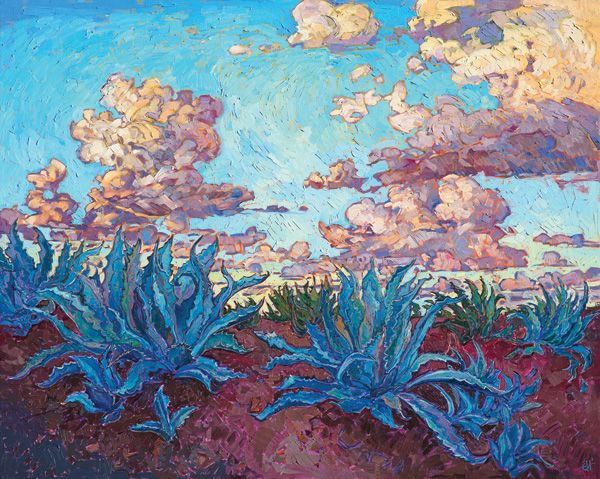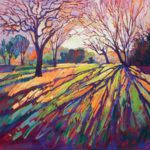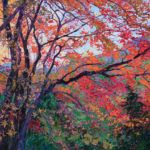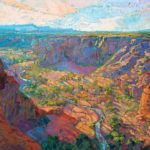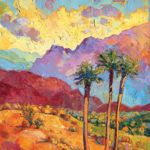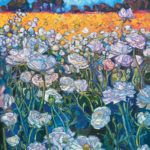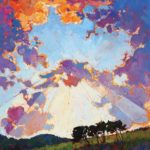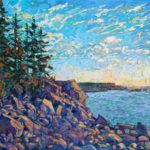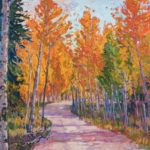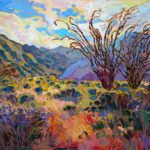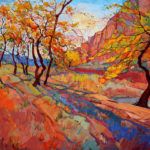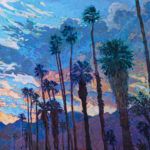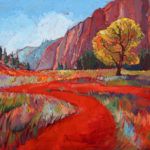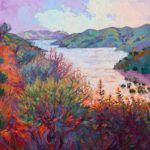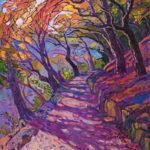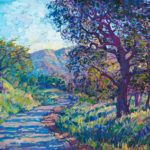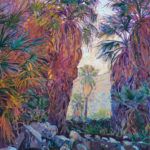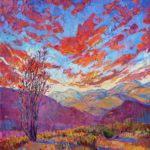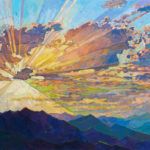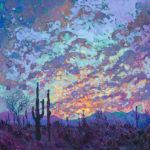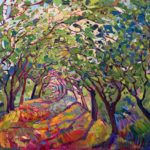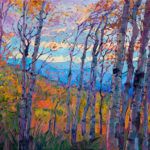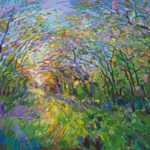California painter Erin Hanson sees the natural world through a rainbow of vibrant hues
By Norman Kolpas
This story was featured in the July 2019 issue of Southwest Art magazine. Get the Southwest Art July 2019 print issue or digital download now–then subscribe to Southwest Art and never miss another story.
When she was 6 years old, Erin Hanson planted some iris bulbs with her mother in the garden of their home in Los Angeles’ Silver Lake neighborhood. “I already knew Van Gogh’s painting of irises,” she says, recalling her excited anticipation of the flowers that would bloom.
So she was crestfallen when those bulbs finally blossomed. “The real irises looked nothing like the painting,” she remembers. But even at that tender age, she derived from her disappointment a lesson that continues to inform her pursuits today, as a successful artist who turns 38 this month: “I knew that art could be better, more real, than real life, and definitely more colorful.”
Hanson’s highly attuned perception of the world’s colors—and her particular talent for sharing her vision through large-scale oil landscapes executed in a dynamic style she describes as “open impressionism”—has earned her uncommon success since she first started selling her paintings merely a dozen years ago. Today, she works primarily out of a 7,000-square-foot warehouse in the design district of San Diego, which includes her spacious studio and The Erin Hanson Gallery, as well as office space and storage from which she and her staff oversee such enterprises as limited-edition prints, coffee-table books, and “tons of traveling shows.”
- Erin Hanson, Crystal Light, oil, 30 x 40.
- Erin Hanson, Dance of Autumn, oil, 36 x 50.
- Erin Hanson, Daybreak, oil, 48 x 36.
Despite this maelstrom of activity, Hanson herself comes across as relaxed yet upbeat and warmly welcomes anyone interested in her art or in the natural world that inspires it. After almost four decades of studies, work, and activities that would be enough to fill a lifetime for most people, she seems to have found her true calling.
When Hanson started school, she was asked what she wanted to be when she grew up. “An artist, a scientist, and a dancer,” was her self-assured response. “I was a very determined, precocious child, and a hard worker,” she says.
The alternative school she attended made it simultaneously easy and challenging to pursue her goals. “Everything was self-learned, self-paced,” she explains. “That was really nice, because I graduated with a total ability to research and teach myself whatever I needed.” Her mom was a teacher at the school, and her three younger brothers also attended. Her dad, a computer programmer, taught her how to code, and at the age of 11 she won the school science fair with “an electronic tic-tac-toe game that could not be beaten,” she says.
- Erin Hanson, Indian Wells, oil, 48 x 36.
- Erin Hanson, Snow Blooms, oil, 20 x 24.
- Erin Hanson, Texan Sky, oil, 40 x 30.
The school’s art teacher, Cesar Jimenez, fostered her early love of art, which received further support at home. “When I was 8, my dad told me that if I wanted to be an artist, I should do five drawings a day. So I filled sketchbook after sketchbook with self-portraits and drawings of my brothers, animals, houses, and trees.”
The school encouraged students to begin finding part-time work in their fields of interest at age 12. “Across the street from the school, there happened to be a mural studio where they would paint huge, 40-by-60-foot acrylic canvases for casinos and restaurants and cruise ships,” Hanson recalls. She showed her portfolio to the studio’s head artist, which led to three years of after-school and weekend employment. “I learned how to mix any color using primaries,” she says. “And I was really good at painting trees. But everybody there would complain to me about how hard it was to be an artist. So I decided I didn’t want to be one.”
Instead, she entered the University of California at Berkeley as a pre-med major. “I loved studying biology with a passion, learning how the human body works,” she says. Then, as a lifelong science-fiction fan raised on authors Robert A. Heinlein and Isaac Asimov, she switched to bioengineering. “I thought it would be great to build robots and work for NASA on the space program.”
- Erin Hanson, Acadia Dawn, oil, 30 x 40.
- Erin Hanson, Aspen Path, oil, 34 x 46.
- Erin Hanson, Borrego in Bloom, oil, 30 x 40.
But then she interned with a bioengineering professor who had “spent the past 10 years, with no results, doing an experiment with rabbit muscle fibers. It struck me as being so myopic, while I’d imagined a bioengineer would be building a robot. That was not what I wanted to do with my life.”
Throughout her time at Berkeley, she also continued pursuing art on her own, checking out books from the library to teach herself Japanese brush painting and comic-book-style graphic art. “I only took one art class, and it was so bizarre. It was all about expressing your psyche, and we never picked up a brush or pencil,” she says.
Back home in Los Angeles after graduation, with no clear career goal yet in sight, Hanson first supported herself with a job selling computer software. Next, she landed a gig managing an eBay drop-off store, where customers could “leave things they wanted to sell, everything and anything, and I would research them, write product descriptions, sell them, and then pack and ship them.” That led her to set out on her own, buying abandoned storage units and reselling the items she found in them, a business she successfully continued for three years after eventually moving to Las Vegas, a prime storage-unit location with its more itinerant population.
- Erin Hanson, Cottonwood Shadow, oil, 60 x 42.
- Erin Hanson, Dusky Palms, oil, 40 x 50.
- Erin Hanson, Hop Valley, oil, 40 x 30.
Ironically, the city of neon lights and noisy casinos was “what got me back into painting,” Hanson remembers. The starkly beautiful Mojave Desert landscape, which she drove through on her way to Vegas, sparked a yearning to pick up a brush again. On her first weekend in the city, she decided to get out and go camping, bringing along her painting supplies and heading to Red Rock Canyon National Conservation Area. Just 15 miles west of the Strip, this unexpected natural wonder features almost 200,000 acres of towering red sandstone peaks and cliffs, a 13-mile scenic drive, seasonal waterfalls, and breathtaking hiking trails. “I woke up at dawn the next morning, and I’d never seen anything like those bright, beautiful colors when the sun first comes up there,” she says. “I thought, Wow! I can paint this. And I took out all my cadmium reds, oranges, and yellows and got started.”
That morning she also met her campsite neighbors—three young men who had moved to Nevada from New York to go rock-climbing. They had extra gear, invited her to join them, and that very afternoon Hanson was climbing the same sheer buttes she’d been painting. They all wound up sharing a big apartment together on the west side of the city, close to the canyon, and “we all became rock-climbing buddies for two years.”
Meanwhile, Hanson applied a sense of discipline to her painting efforts that traced back to the advice her father gave her about drawing when she was 8. “‘A painting a week’ was my mantra,” she says. “I didn’t tell anybody about it, and I wasn’t painting to make a living at it. But a year later I had about 50 paintings, and I decided I would try to sell them.”
- Erin Hanson, Lights on Whale Rock, oil, 60 x 60.
- Erin Hanson, Mosaic Path, oil, 36 x 24.
- Erin Hanson, Oaken Walk, oil, 30 x 40.
She heard about an art festival coming up in Boulder City, NV, about half an hour away, so she rented a 10-by-10-foot tent and some display walls, packed up her 12 best paintings, and headed out. “I sold six,” she says, still amazed by that initial reception. More weekend events and enthusiastic sales followed. “And I’ve been doing art festivals ever since—still to this day. It’s such a great experience to talk to people in person about my art.”
Steadily, through countless paintings, trips, and rock-climbing adventures, Hanson’s signature style emerged. “When you climb a rock, you’re focusing on a crack between two planes,” she explains. “So when I painted a place I had climbed, I would outline the cracks. It’s those distinct lines and shadows that make the powerful composition of a desert landscape.”
Over the years since, that stylistic approach became more clearly defined and refined. After she moved back to California in 2008, eventually settling in San Diego, her palette expanded to embrace cooler, more verdant hues as well as warm tones. “I was baffled at first, not knowing how to paint green hills and trees,” she confesses. “So I outlined the trees and the hills in black to make them more powerful.”
- Erin Hanson, Oasis Palms, oil, 34 x 28.
- Erin Hanson, Ocotillo Sky, oil, 40 x 30.
- Erin Hanson, Radiant Sky, oil, 40 x 60.
Today, regardless of the subject, Hanson will “preplan every painting in my head before I ever pick up a brush,” she says. “Then I create a composition in a sketchbook that I transfer with scrubby brushes to my primed canvas.” No color choice happens randomly: “I premix my entire palette, every color I’m going to use.” Then, one bold color at a time, she very deliberately lays down each stroke of paint, never going over it again. “That adds to the power of the painting,” she says. “I avoid muddy colors.”
The results seem to pulse with energy. In some of her canvases, stormy desert skies are full of swirling motion; in other pieces, bolder brush strokes capture the ancient power of rock formations. Tiny Japanese maple leaves burnished by fall form a vibrant filigree in DANCE OF AUTUMN, inspired by a trip Hanson took to Kyoto in 2017.
Many of her works are large, some as wide or tall as 5 feet, befitting the monumentality of the world as Hanson sees it. Recently, though, she has also begun painting floral images of much more modest dimensions. “As I’m getting larger, my paintings are getting smaller,” she laughs, referring to her pregnancy—her first child, a girl, is due in July. She and her husband, Paul Shoden, hope to have a second child in the not-too-distant future and eventually move up to Oregon’s Willamette Valley. “I have this fantasy to get a huge estate where we can create something like Georgia O’Keeffe’s Ghost Ranch—an artists’ retreat where people can come and stay over the weekend—and my inspiration is right outside my front door.”
Knowing what Hanson has already accomplished, that fantasy may very likely become a reality, all executed in bold strokes of bright, pure color.
representation
The Erin Hanson Gallery, San Diego, CA; Medicine Man Gallery, Tucson, AZ.
- Erin Hanson, Saguaro Dusk, oil, 48 x 48.
- Erin Hanson, The Path, oil, 28 x 40.
- Erin Hanson, Utah Aspens, oil, 30 x 40.
- Erin Hanson, Viridian Path, oil, 30 x 40.
This story was featured in the July 2019 issue of Southwest Art magazine. Get the Southwest Art July 2019 print issue or digital download now–then subscribe to Southwest Art and never miss another story.
MORE RESOURCES FOR ART COLLECTORS & ENTHUSIASTS
• Subscribe to Southwest Art magazine
• Learn how to paint & how to draw with downloads, books, videos & more from North Light Shop
• Sign up for your Southwest Art email newsletter & download a FREE ebook






